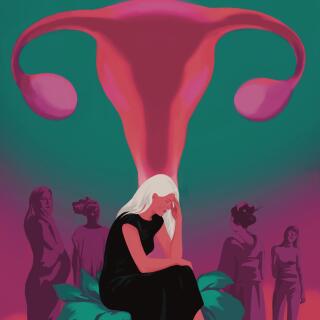


Menopause: Unpicking a biological and social taboo
InvestigationThe way women experience and understand this stage in their lives has evolved greatly and continues to raise questions among doctors and human science researchers. While the issue remains relatively taboo in society, the lines are beginning to shift.
Hot flushes, night sweats, palpitations, vaginal dryness, urinary disorders, fatigue, insomnia, irritability, anxiety, joint pain, increased risk of developing osteoporosis or cardiovascular disease... This long list of symptoms is often used to define menopause. Marked by the definitive cessation of menstruation, the natural stage of biological aging can occur either abruptly or gradually. In today's society, menopause is most commonly thought of as a hormonal disorder that can require medical attention and, in some cases, medical treatment.
Yet menopause cannot be reduced to these physical manifestations alone. Just as the onset of menstruation signals entry into adulthood in many cultures and, above all, femininity – menstruation, fertility and femininity are often inextricably linked – menopause is often seen as one of the biggest signs of aging. But menopause can occur very early in a person's life, and if menstruation makes a woman during puberty, what does she become when it ends?
For American poet Mary Ruefle, it turned her into nothing less than a ghost, as she wrote in a text entitled Pause and published in the 2016 collection My Private Property: "No matter how attractive or unattractive you are, you have been used to having others look you over when you stood at the bus stop or at the chemist's to buy tampons. They have looked you over to assess how attractive or unattractive you are, so no matter what the case, you were looked at. Those days are over; now others look straight through you, you are completely invisible to them, you have become a ghost. You no longer exist."
Of course, not all menopausal women share Ruefle's outlook. Still, whether it is felt as a decline or a liberation, this experience demonstrates how menopause is at least as much a social phenomenon as a biological one.
"The idea isn't to refute the bodily manifestations that can occur during menopause or to say that menopause doesn't lead to any physiological transformation," said Cécile Charlap, a lecturer in sociology at Toulouse-Jean Jaurès University and the author of La Fabrique de la Ménopause ("The Menopause Factory"). "But, if we take an analytical view of the descriptions of menopause in medical literature, we see that they convey social representations that greatly influence how we perceive this time of life."
The sociologist noted that in French medical discourse, menopause is most often presented not as a transformation in the normal course of aging leading to a new hormonal norm but as a loss, a lack, a deficiency. "Yet deficiency implies the existence of a norm to which it is compared: This norm is the hormonal levels of fertile women," continued Charlap. "Menopause is actually approached through an entire system of representations that disqualify the sterile female body – and it is therefore experienced as such, as an experience of disqualification."
You have 85% of this article left to read. The rest is for subscribers only.
